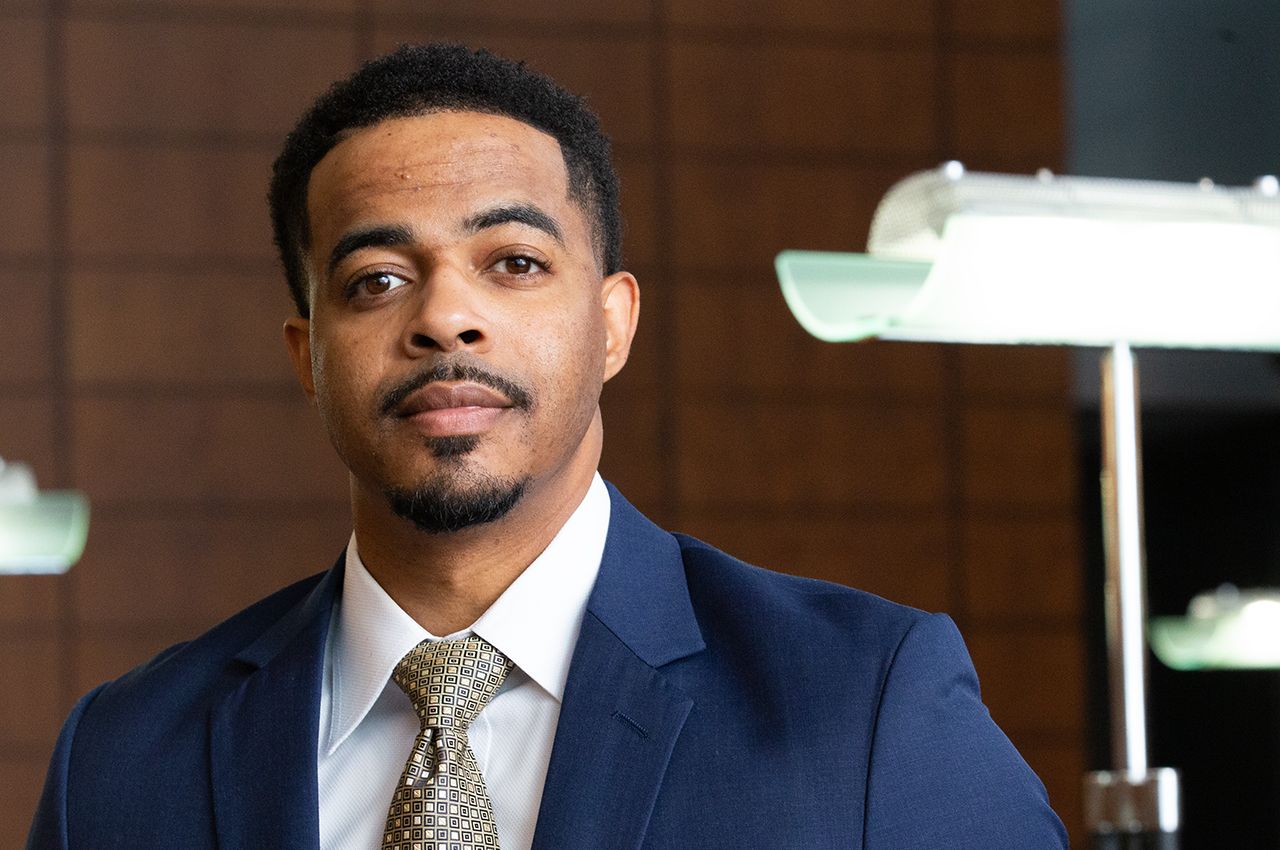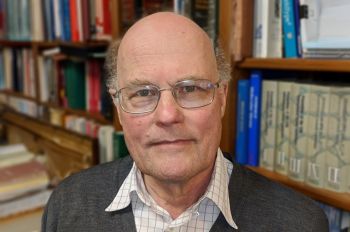To be a Lawyer Now, or to be a Lawyer?

Xavier Harris (LAW ’23) was 10 years old when he decided that he wanted to be a lawyer. At the time, he had no idea how difficult it would be.
When it came time to apply for college, Harris wanted to study political science or psychology, but he couldn’t get the scholarships that he needed. He realized that he needed to take a detour.
“I started coming up with plans A through E,” says Harris, who will graduate from Chicago-Kent College of Law on May 14.
He turned to the United States Air Force’s Reserve Officer Training Corps program. The program is competitive, and scholarships are awarded based on military needs. At the time, the Air Force needed officers in STEM fields, so that’s what Harris applied to study.
“I didn’t even know what engineers were. All I had ever thought of was a doctor or lawyer,” he says. “I initially chose to study civil engineering because when I was reading the descriptions, it was the only one I could understand in that short notice.” He ultimately settled on industrial and systems engineering because he found the project management and process improvement aspects of the degree more interesting and useful across various industries.
Harris received an Air Force ROTC scholarship and went to Mississippi State University and majored in systems engineering. But he still wanted to be a lawyer and struggled to accept his new reality.
“At 18, I went to college kicking and screaming. I grew up with both parents in the military. We moved every three years my entire life, so I wasn’t entirely sold on the idea of continuing that lifestyle for myself” he says. “My first year [at Mississippi State] was full of complaints and not realizing the blessing of it. I was going to school for free. Hindsight is 20/20. I’m really glad for those experiences.”
“At a young age, it’s challenging to accept that you have to take the long route to your dream,” he adds. “At some point I started asking myself, ‘Is the goal to be a lawyer tomorrow, or is the goal to be a lawyer?’”
Harris spent three years as a systems engineer in the Air Force. Then he taught chemistry at the U.S. Air Force Academy for another three years. Despite his initial detour, he enjoyed his time as an engineer and an instructor, and he learned a lot along the way. It was during his tour at the Air Force Academy where Harris was able to discover a deep passion for mentorship that has guided his professional career.
“I’ve only had a positive experience. I haven’t had an experience in the military that I didn’t ask for,” he says with his fingers crossed, praying for a similar future.
However, he always had his eye on another one of the military’s education programs: the Funded Legal Education Program (FLEP). If accepted, the Air Force would pay for his law school, with a six-year service commitment to the Air Force Judge Advocate General’s Corps (JAG). In order to apply, he needed to be released from his duties as an engineer. He started asking in 2014. Every year, he was told that his position was essential, and his request to apply to FLEP was denied.
His last year of eligibility for the program was 2020. If he didn’t get it then, he would have to go to law school on his own.
“Why would you tell me not to apply for a program that will keep me in the military, at a bare minimum, for another nine years?” he says he asked his superiors. “I have my follow-up assignment. I’ll go if this doesn’t work. But please let me try.”
He was given the green light.
The Air Force describes the application process for FLEP program as “competitive, rigorous, and highly selective.” The number of officers chosen depends on funding. In 2020 they would only choose four officers.
One of them was Harris.
“This colonel called me and said, ‘Captain Harris, I just want to call and let you know that you’re going to law school this fall.’ I put the phone on mute and me and my dad, we screamed and ran through the house,” Harris says, laughing at the memory.
While at Chicago-Kent, Harris acted as a senior associate for Chicago-Kent Law Review. He also found success in the Moot Court Honor Society. He even took home Chicago-Kent’s second annual A More Perfect Union racial justice writing competition in 2022 for his paper “The Miseducation of a Divided Nation: An Analysis of Laws Banning Critical Race Theory in K-12 Public Schools.” The paper was ultimately selected for publication with the Dartmouth Law Journal and is expected to be released publicly June 2023. Harris also completed an externship with the intellectual property group at Seyfarth Shaw LLP in 2022.
This was never the route that Harris expected to take in order to realize his dream of becoming an attorney. But his long journey is something he now sees as a strength.
“Adapting to law school was a bit smoother than I think it would have been if I had gotten this opportunity exactly when I wanted it,” he says. “When I was 18, when I was 22, I thought I knew. But I didn’t know. It comes with age. The older you get, the wiser you become. It just makes me appreciate the detour so much more.”
A week after he takes the bar exam, Harris will report to Ramstein Air Base in Germany to practice military justice. He hopes to expand into contract law to build on his technical engineering knowledge. He also plans to continue mentoring other young people struggling to reach their dreams.
As Commencement day nears, Harris has a piece of advice that he gives to every young officer who crosses his door, asking for help.
“I hope you get everything you want now,” he tells them. “But if you don’t, the world isn’t over. It’s going to come. If you decide you need to take another route, that’s OK. Because is your goal to be a lawyer now, or to be a lawyer?”




